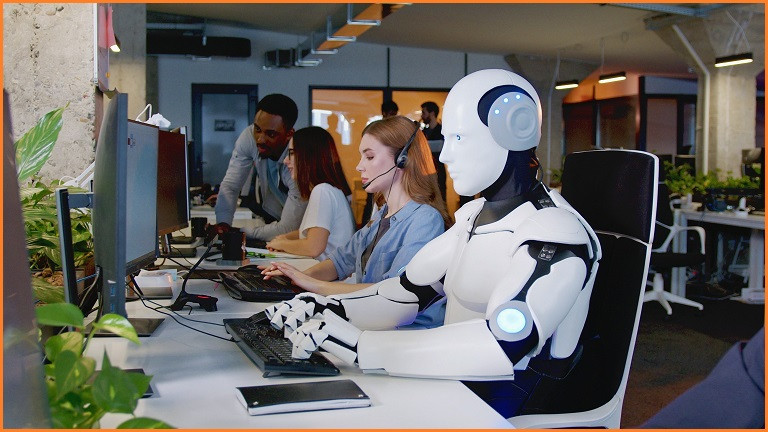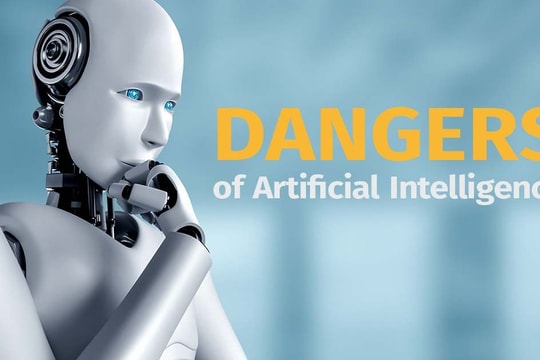How will the rise of artificial intelligence impact global employment?
(Baonghean.vn) - According to the International Monetary Fund (IMF), nearly 40% of jobs worldwide could be affected by the development of artificial intelligence (AI), a trend that is likely to increase inequality.
In a blog post on January 14, IMF Managing Director Kristalina Georgieva called on governments to set up social safety nets and provide retraining programs to cope with the impact of AI.
“In most scenarios, AI is likely to exacerbate overall inequality, a worrying trend that policymakers must proactively address to prevent the technology from further fueling social tensions,” Georgieva wrote ahead of the World Economic Forum (WEF) annual meeting in Davos, Switzerland, where the topic will be hotly debated.

The annual event will feature prominent figures in the technology industry, including Sam Altman, CEO of OpenAI - the developer of ChatGPT, and Microsoft CEO Satya Nadella, who will discuss the topic “Generative Artificial Intelligence: The Key Engine of the Fourth Industrial Revolution.”
As AI continues to be adopted by more workers and businesses, it is predicted to both help and hurt the workforce, Georgieva notes in her blog.
Echoing earlier warnings from other experts, Ms Georgieva said the impacts were expected to be more profound in developed economies than emerging markets, in part because office workers were thought to be at higher risk than manual workers.
In more developed economies, AI could impact up to 60% of jobs. Of those, about half could benefit from AI driving higher productivity, Ms. Georgieva said.
“For the other half, AI applications could take over important tasks currently performed by humans, which could lead to a reduction in demand for labor, resulting in lower wages and fewer jobs. In extreme cases, some of these jobs could disappear altogether,” Georgieva said.
In emerging markets and low-income countries, 40% and 26% of jobs are expected to be affected by AI, respectively. Emerging markets are places like India and Brazil with sustained economic growth, while low-income countries are developing economies with a certain level of per capita income, such as Burundi and Sierra Leone.
“Many of these countries do not have the infrastructure or skilled workforce to take advantage of the benefits of AI, and over time this technology could exacerbate inequality,” Ms. Georgieva noted.
Ms Georgieva also warned that the use of AI could increase the likelihood of social unrest, especially as younger, less experienced workers take advantage of the technology to increase productivity while older workers struggle to keep up with the new technology.
AI became a hot topic at the World Economic Forum in Davos last year when ChatGPT took the world by storm. Generative AI-powered chatbots sparked discussions about how they could change the way people work around the world, with their ability to write essays, speeches, poems, and more.
Since then, technological advancements have expanded the use of chatbots and AI systems, making them more popular and prompting major investments. Some tech companies have directly cited AI as a reason they are rethinking staffing levels.
While the workplace may change, widespread adoption of AI could eventually boost labor productivity and boost global GDP by 7% annually over a 10-year period, according to estimates by economists at US multinational investment bank Goldman Sachs.
Goldman Sachs' research also emphasizes that job losses and the impact of AI will vary across industries and sectors. The administrative and legal sectors will be most affected, with 46% and 44%, respectively, at risk of being replaced by AI.
Jobs with the least exposure to AI include cleaning and maintenance, installation and repair, and construction-related jobs.
Physically intensive occupations face low risks, with the construction sector facing just a 6% threat while maintenance-related work is only at a 4% risk.
Emphasizing the impact of AI on the global economy, the Director of the International Monetary Fund said: “Artificial intelligence will transform the global economy. Let's make sure this technology benefits humanity.”


